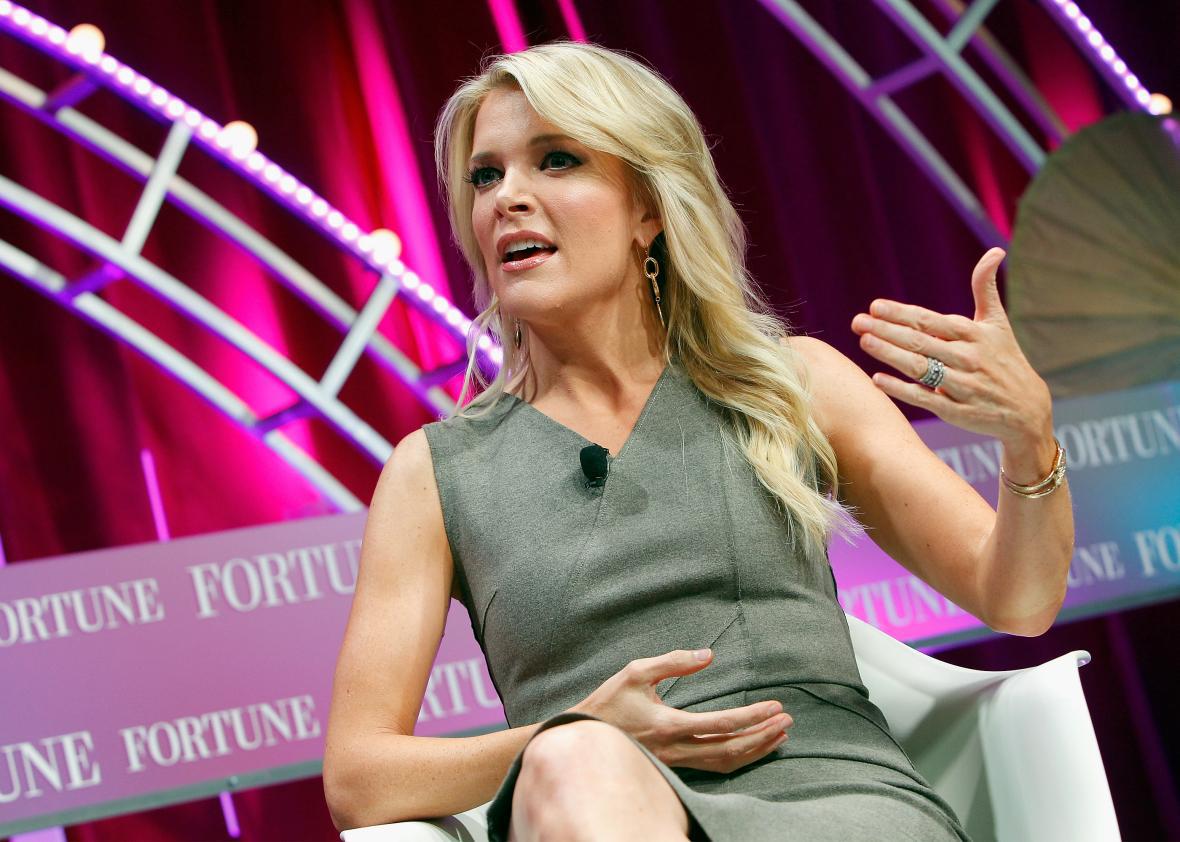Megyn Kelly’s bid to position herself as a sensible center-right commentator and the next great longform TV journalist hit another milestone today: a Vanity Fair cover profile that dubs her “Fox News’s brightest, toughest star” and a “feminist icon of sorts.” Kelly doesn’t call herself a feminist, though, in part because Kelly says “her accomplishments speak for themselves and have nothing to do with her gender,” Evgenia Peretz writes.
Kelly lauds Oprah Winfrey as her career role model because, she claims, the queen of talk-show television didn’t make a fuss about being a woman of color:
In all her years coming up … [Winfrey] never wallowed in any sort of victimhood. … She didn’t play the gender card and she didn’t play the race card. She was just so good we couldn’t ignore her. That’s my example. … Just get to the table and then do better than everybody else. But every so often, as all [women] know, you have to stop and slap somebody around a little bit who doesn’t understand that we are actually equals and not second-class citizens.
Indeed, many of the recent moments that have endeared the Kelly File host to younger, more progressive viewers have sprung from her defense of women against misogynist remarks. Kelly garnered sympathy and solidarity from scores of feminists when she called out Donald Trump’s record of sexist insults last year and got a menstruation joke in return; she got similar praise when she informed Mike Huckabee that women sometimes swear. But, as Amanda Marcotte argued in Slate, Kelly is hardly deserving of a feminist participation trophy. “These are men whose gender politics are so retrograde you next expect them to complain about women in trousers,” Marcotte wrote. “Standing up against them is hardly some great strike for the sisterhood.”
Kelly’s admiration for Winfrey is well documented. According to Variety, she’s a “lifelong fan.” She’s used Oprah’s “a-ha moment” paradigm to frame her success. Her husband compares her to Oprah (plus Walter Cronkite, Grace Kelly, and Barbara Walters) in the Vanity Fair piece. Members of the media have played along with Kelly’s narrative, too: In August of 2015, Fortune called her “the next Oprah.”
But in her desire to prove herself worthy of a Winfrey-esque platform—and, possibly, to allay accusations of racism by publicly praising a black woman as her role model—Kelly is trying to rewrite Winfrey’s history. Winfrey explicitly addressed racism on her show on several occasions, including one unsubtle but seemingly effective audience exercise in 1992. She’s been outspoken about her own experiences with everyday racial prejudice and given platforms to guests who patiently explain post-Jim Crow racism to perpetrators of post-Jim Crow racism. In 2013, Winfrey noted that America’s culture of racism is unlikely to change until “generations of people, older people, who were born and bred and marinated in it in that prejudice and racism” die off.
That’s when Kelly hosted conservative commentator Allen West on her show to accuse Winfrey of “playing the race card.” “It’s amazing to see someone as successful as Oprah Winfrey—I mean, a billionaire, thanks in large part to American viewers loving her, white, black, brown, you name it, loving her—talking about racist Americans,” Kelly said.
She and West went back and forth, trying to discredit Winfrey’s claim that Rep. Joe Wilson’s “You lie!” outburst was indicative of the race-based disrespect Barack Obama has faced in office. “Now, in a court of law, that would not fly,” Kelly said. “There is nothing in that exchange to suggest it’s based on race.” West said Winfrey was trying to silence Obama’s critics in a “last line of defense,” a “suppression of your freedom of speech.”
“It’s interesting to see how [Oprah’s] ratings have gone down and her TV success has struggled since she did get political and started making certain statements like this,” Kelly said. “The example she used was telling.”
Pointing out racism is not “playing the race card,” and discussing gender-based discrimination is not “wallowing in victimhood.” Kelly’s compliments to Winfrey set up a straw man of a whiny, overly sensitive feminist who blames the white heteropatriarchy for her own shortcomings. Meanwhile, Kelly’s own gentle ribbing of far-right misogynists, which has earned her the goodwill of some who normally distrust Fox News, is not a grand departure from the tradition of the network. “The Kelly File, which Kelly bills as a ‘news’ show as opposed to an opinion show, like Hannity or The O’Reilly Factor, is made up largely of the kind of stories you’d find on many other Fox News shows at any other time,” Peretz writes. She may not spew the same backwards vitriol as some of her more radical right-wing guests, but she gives them airtime and a wide audience at the expense of more rational perspectives.
To wit: Last year, in the wake of reports that conservative-Christian poster boy Josh Duggar had molested underage girls, including his sisters, Kelly gave a softball interview to parents Michelle and Jim Bob Duggar, who kept Josh’s abuse quiet and sent him for “treatment” at a religious facility that’s since been accused of its own sex-abuse cover-up. In the segment, Kelly asked the Duggars if they attracted so much public hatred because they’re Christians.
With a primetime series of specials on Fox, Kelly will deliver more of that brand of hard-hitting journalism in coming months. “Barbara Walters has retired,” Kelly told Variety of her desire to do more longform interviews. “Diane Sawyer left her anchor role. Oprah has moved to the OWN network and is doing a different thing now. So why not me?” Walters, Sawyer, and Winfrey may not have reached TV superstardom by dwelling on race and gender, but they didn’t earn their viewers’ trust by giving anti-woman voices an uncritical platform, either.
